Search Results for 'wood'
-
AuthorSearch Results
-
December 14, 2021 at 9:28 pm #6231
In reply to: The Elusive Samuel Housley and Other Family Stories
Gladstone Road
My mother remembers her grandfather Samuel Warren’s house at 3 Gladstone Road, Stourbridge. She was born in 1933, so this would be late 1930s early 1940s.
“Opening a big wooden gate in a high brick wall off the sidewalk I went down a passage with a very high hedge to the main house which was entered on this side through a sort of glassed-in lean-to then into the dark and damp scullery and then into a large room with a fireplace which was dining room and living room for most of the time. The house was Georgian and had wooden interior shutters at the windows. My Grandad sat by the fire probably most of the day. The fireplace may have had an oven built over or to the side of the fire which was common in those days and was used for cooking.
That room led into a hall going three ways and the main front door was here. One hall went to the pantry which had stone slabs for keeping food cool, such a long way from the kitchen! Opposite the pantry was the door to the cellar. One hall led to two large rooms with big windows overlooking the garden. There was also a door at the end of this hallway which opened into the garden. The stairs went up opposite the front door with a box room at the top then along a landing to another hall going right and left with two bedrooms down each hall.
The toilet got to from the scullery and lean-to was outside down another passage all overgrown near the pigsty. No outside lights!
On Christmas day the families would all have the day here. I think the menfolk went over to the pub {Gate Hangs Well?} for a drink while the women cooked dinner. Chris would take all the children down the dark, damp cellar steps and tell us ghost stories scaring us all. A fire would be lit in one of the big main rooms {probably only used once a year} and we’d sit in there and dinner was served in the other big main room. When the house was originally built the servants would have used the other room and scullery.
I have a recollection of going upstairs and into a bedroom off the right hand hall and someone was in bed, I thought an old lady but I was uncomfortable in there and never went in again. Seemed that person was there a long time. I did go upstairs with Betty to her room which was the opposite way down the hall and loved it. She was dating lots of soldiers during the war years. One in particular I remember was an American Army Officer that she was fond of but he was killed when he left England to fight in Germany.
I wonder if the person in bed that nobody spoke about was an old housekeeper?
My mother used to say there was a white lady who floated around in the garden. I think Kay died at Gladstone Road!”Samuel Warren, born in 1874 in Newhall, Derbyshire, was my grandmothers father. This is the only photograph we’ve seen of him (seated on right with cap). Kay, who died of TB in 1938, is holding the teddy bear. Samuel died in 1950, in Stourbridge, at the age of 76.
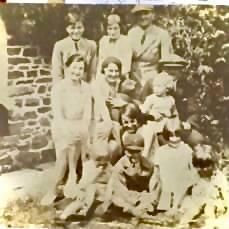
Left to right: back row: Leslie Warren. Hildred Williams / Griffiths (Nee Warren). Billy Warren. 2nd row: Gladys (Gary) Warren. Kay Warren (holding teddy bear). Samuel Warren (father). Hildred’s son Chris Williams (on knee). Lorna Warren. Joan Williams. Peggy Williams (Hildreds daughters). Jack Warren. Betty Warren.
December 13, 2021 at 2:34 pm #6227In reply to: The Elusive Samuel Housley and Other Family Stories
The Scottish Connection
My grandfather always used to say we had some Scottish blood because his “mother was a Purdy”, and that they were from the low counties of Scotland near to the English border.
My mother had a Scottish hat in among the boxes of souvenirs and old photographs. In one of her recent house moves, she finally threw it away, not knowing why we had it or where it came from, and of course has since regretted it! It probably came from one of her aunts, either Phyllis or Dorothy. Neither of them had children, and they both died in 1983. My grandfather was executor of the estate in both cases, and it’s assumed that the portraits, the many photographs, the booklet on Primitive Methodists, and the Scottish hat, all relating to his mother’s side of the family, came into his possession then. His sister Phyllis never married and was living in her parents home until she died, and is the likeliest candidate for the keeper of the family souvenirs.
Catherine Housley married George Purdy, and his father was Francis Purdy, the Primitive Methodist preacher. William Purdy was the father of Francis.
Record searches find William Purdy was born on 16 July 1767 in Carluke, Lanarkshire, near Glasgow in Scotland. He worked for James Watt, the inventor of the steam engine, and moved to Derbyshire for the purpose of installing steam driven pumps to remove the water from the collieries in the area.
Another descendant of Francis Purdy found the following in a book in a library in Eastwood:

William married a local girl, Ruth Clarke, in Duffield in Derbyshire in 1786. William and Ruth had nine children, and the seventh was Francis who was born at West Hallam in 1795.
Perhaps the Scottish hat came from William Purdy, but there is another story of Scottish connections in Smalley: Bonnie Prince Charlie and the Jacobite Rebellion of 1745. Although the Purdy’s were not from Smalley, Catherine Housley was.
From an article on the Heanor and District Local History Society website:
The Jacobites in Smalley
Few people would readily associate the village of Smalley, situated about two miles west of Heanor, with Bonnie Prince Charlie and the Jacobite Rebellion of 1745 – but there is a clear link.
During the winter of 1745, Charles Edward Stuart, the “Bonnie Prince” or “The Young Pretender”, marched south from Scotland. His troops reached Derby on 4 December, and looted the town, staying for two days before they commenced a fateful retreat as the Duke of Cumberland’s army approached.
While staying in Derby, or during the retreat, some of the Jacobites are said to have visited some of the nearby villages, including Smalley.
A history of the local aspects of this escapade was written in 1933 by L. Eardley-Simpson, entitled “Derby and the ‘45,” from which the following is an extract:
“The presence of a party at Smalley is attested by several local traditions and relics. Not long ago there were people living who remember to have seen at least a dozen old pikes in a room adjoining the stables at Smalley Hall, and these were stated to have been left by a party of Highlanders who came to exchange their ponies for horses belonging to the then owner, Mrs Richardson; in 1907, one of these pikes still remained. Another resident of Smalley had a claymore which was alleged to have been found on Drumhill, Breadsall Moor, while the writer of the History of Smalley himself (Reverend C. Kerry) had a magnificent Andrew Ferrara, with a guard of finely wrought iron, engraved with two heads in Tudor helmets, of the same style, he states, as the one left at Wingfield Manor, though why the outlying bands of Army should have gone so far afield, he omits to mention. Smalley is also mentioned in another strange story as to the origin of the family of Woolley of Collingham who attained more wealth and a better position in the world than some of their relatives. The story is to the effect that when the Scots who had visited Mrs Richardson’s stables were returning to Derby, they fell in with one Woolley of Smalley, a coal carrier, and impressed him with horse and cart for the conveyance of certain heavy baggage. On the retreat, the party with Woolley was surprised by some of the Elector’s troopers (the Royal army) who pursued the Scots, leaving Woolley to shift for himself. This he did, and, his suspicion that the baggage he was carrying was part of the Prince’s treasure turning out to be correct, he retired to Collingham, and spent the rest of his life there in the enjoyment of his luckily acquired gains. Another story of a similar sort was designed to explain the rise of the well-known Derbyshire family of Cox of Brailsford, but the dates by no means agree with the family pedigree, and in any event the suggestion – for it is little more – is entirely at variance with the views as to the rights of the Royal House of Stuart which were expressed by certain members of the Cox family who were alive not many years ago.”
A letter from Charles Kerry, dated 30 July 1903, narrates another strange twist to the tale. When the Highlanders turned up in Smalley, a large crowd, mainly women, gathered. “On a command in Gaelic, the regiment stooped, and throwing their kilts over their backs revealed to the astonished ladies and all what modesty is careful to conceal. Father, who told me, said they were not any more troubled with crowds of women.”
Folklore or fact? We are unlikely to know, but the Scottish artefacts in the Smalley area certainly suggest that some of the story is based on fact.
We are unlikely to know where that Scottish hat came from, but we did find the Scottish connection. William Purdy’s mother was Grizel Gibson, and her mother was Grizel Murray, both of Lanarkshire in Scotland. The name Grizel is a Scottish form of the name Griselda, and means “grey battle maiden”. But with the exception of the name Murray, The Purdy and Gibson names are not traditionally Scottish, so there is not much of a Scottish connection after all. But the mystery of the Scottish hat remains unsolved.
December 13, 2021 at 1:27 pm #6226In reply to: The Elusive Samuel Housley and Other Family Stories
Border Straddlers of The Midlands
It has become obvious while doing my family tree that I come from a long line of border straddlers. We seem to like to live right on the edge of a county, sometimes living on one side of the border, sometimes on the other. What this means is that for every record search, one must do separate searches in both counties.
The Purdy’s and Housley’s of Eastwood and Smalley are on the Derbyshire Nottinghamshire border. The Brookes in Sutton Coldfield are on the Staffordshire Warwickshire border. The Malkins of Ellastone and Ashbourne are on the Staffordshire Derbyshire border, as are the Grettons and Warrens of Burton Upon Trent. The Warrens and Grettons of Swadlincote are also on the Leicestershire border, and cross over into Ashby de la Zouch.
I noticed while doing the family research during the covid restrictions that I am a border straddler too. My village is half in Cadiz province and half in Malaga, and if I turn right on my morning walk along the dirt roads, I cross the town boundary into Castellar, and if I turn left, I cross into San Roque. Not to mention at the southern tip of Spain, I’m on the edge of Europe as well.
More recent generations of the family have emigrated to Canada, USA, South Africa, Australia, and Spain, but researching further back, the family on all sides seems to have stuck to the midlands, like a dart board in the middle of England, the majority in Derbyshire, although there is one family story of Scottish blood.
December 13, 2021 at 12:33 pm #6225In reply to: The Elusive Samuel Housley and Other Family Stories
William Marshall’s Parents
William Marshall 1876-1968, my great grandfather, married Mary Ann Gilman Purdy in Buxton. We assumed that both their families came from Buxton, but this was not the case. The Marshall’s came from Elton, near Matlock; the Purdy’s from Eastwood, Nottinghamshire.
William Marshall, seated in centre, with colleagues from the insurance company:
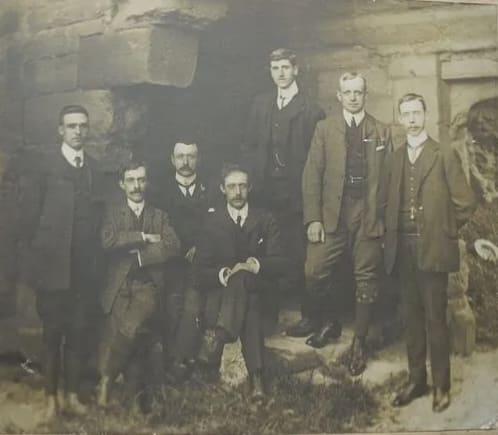
William and all his siblings were born in Fairfield in Buxton. But both Emma Featherstone 1847-1928, his mother, and John Marshall 1842-1930, his father, came from rural Derbyshire. Emma from Ashbourne (or Biggin, Newhaven, or Hartington, depending on what she chose to put on the census, which are all tiny rural places in the same area).
Emma and John Marshall in the middle, photo says “William Marshall’s parents” on the back:
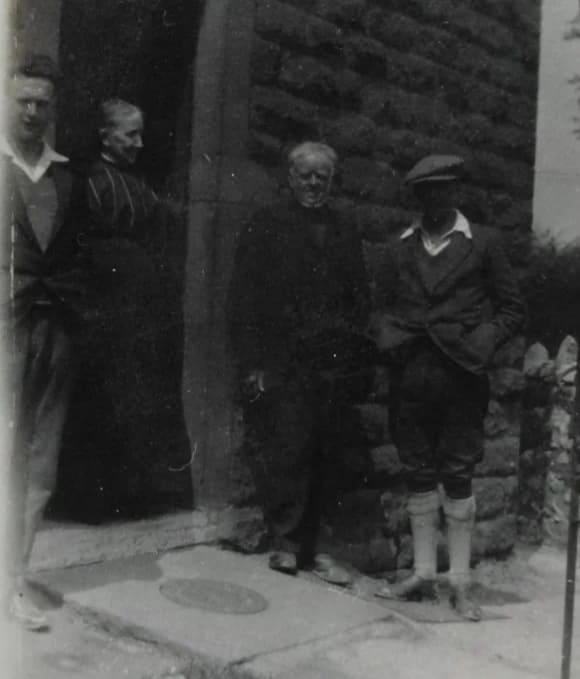
John Marshall was a carter, later a coal carter, and was born in Elton, Derbyshire. Elton is a rural village near to Matlock. He was unable to write (at least at the time of his wedding) but Emma signed her own name.
In 1851 Emma is 3 or 4 years old living with family at the Jug and Glass Inn, Hartington. In 1861 Emma was a 14 year old servant at a 112 acre farm, Heathcote, but her parents were still living at the Jug and Glass. Emma Featherstone’s parents both died when she was 18, in 1865.
In 1871 she was a servant at Old House Farm, Nether Hartington Quarter, Ashborne.On the census, a female apprentice was listed as a servant, a boy as an apprentice. It seems to have been quite normal, at least that’s what I’ve found so far, for all teenagers to go and live in another household to learn a trade, to be independent from the parents, and so doesn’t necessarily mean a servant as we would think of it. Often they stayed with family friends, and usually married in their early twenties and had their own household ~ often with a “servant” or teenager from someone else’s family.
The only marriage I could find for Emma and John was in Manchester in 1873, which didn’t make much sense. If Emma was single on the 1871 census, and her first child James was born in 1873, her marriage had to be between those dates. But the marriage register in Manchester appears to be correct, John was a carter, Emma’s father was Francis Featherstone. But why Manchester?

I noticed that the witnesses to the marriage were Francis and Elizabeth Featherstone. He father was Francis, but who was Elizabeth? Emma’s mother was Sarah. Then I found that Emma’s brother Francis married Elizabeth, and they lived in Manchester on the 1871 census. Henry Street, Ardwick. Emma and John’s address on the marriage register is Emily Street, Ardwick. Both of them at the same address.
The marriage was in February 1873, and James, the first child was born in July, 1873, in Buxton.
It would seem that Emma and John had to get married, hence the move to Manchester where her brother was, and then quickly moved to Buxton for the birth of the child. It was far from uncommon, I’ve found while making notes of dates in registers, for a first child to be born six or 7 months after the wedding.
Emma died in 1928 at the age of 80, two years before her husband John. She left him a little money in her will! This seems unusual so perhaps she had her own money, possibly from the death of her parents before she married, and perhaps from the sale of the Jug and Glass.
I found a photo of the Jug and Glass online. It looks just like the pub I’d seen in my family history meditations on a number of occasions:
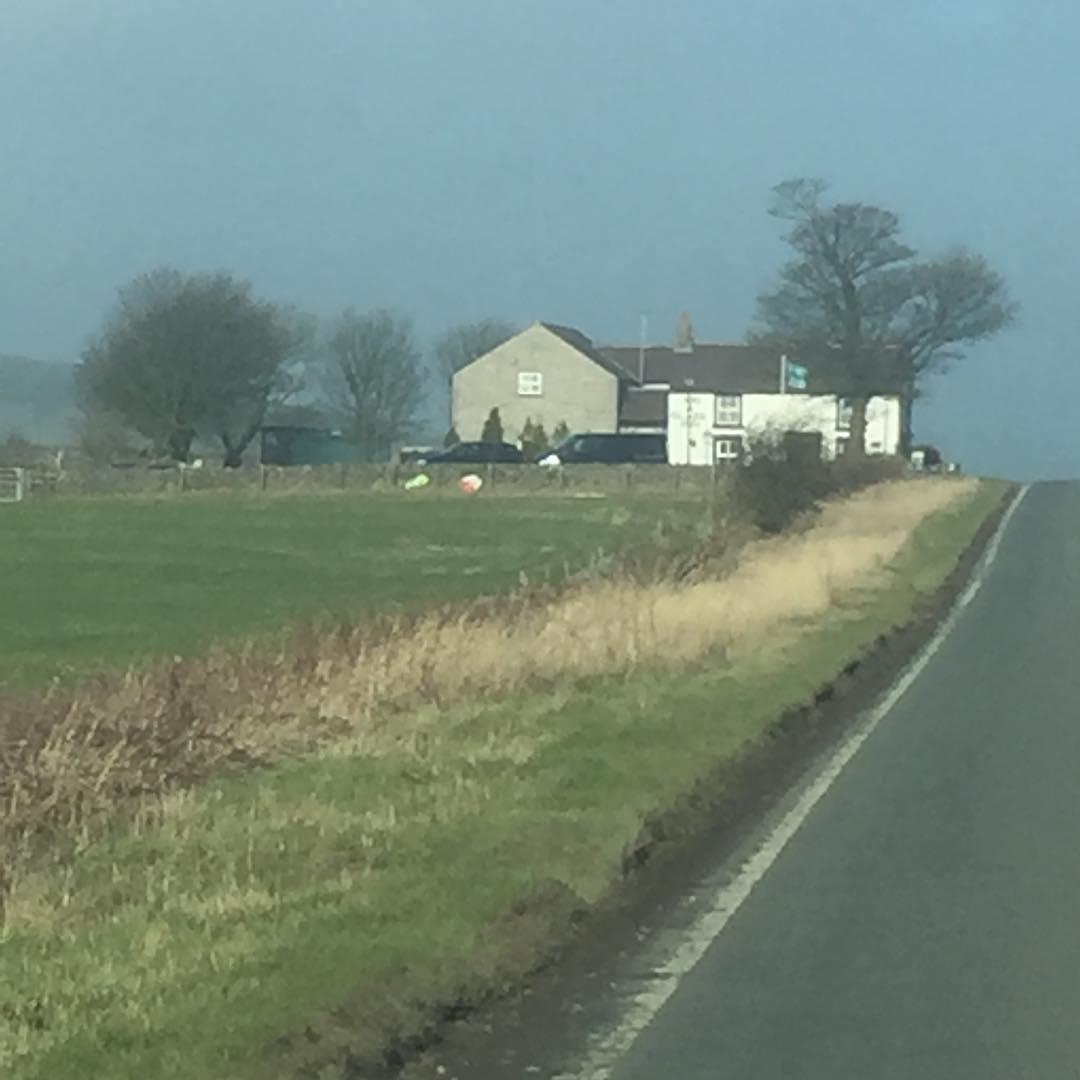 December 13, 2021 at 11:58 am #6223
December 13, 2021 at 11:58 am #6223In reply to: The Elusive Samuel Housley and Other Family Stories
Kate Purdy and the DH Lawrence Connection
Catherine (Kate) Purdy 1874-1950 was my grandfather George Marshall’s aunt, and the mother of George Rushby who went to Africa. The photo is one of our family photos, and we knew that the woman at the back third from the right was an aunt of my grandfather’s. We didn’t know that it was Kate until we saw other photos of her in Mike’s collection.
DH Lawrence was born in Eastwood at roughly the same time as my great grandmother Mary Ann Gilman Purdy. Apparently his books are based on actual people living in the area at the time, so I read as many of his books as I could find, to help paint the picture of the time and place. I also found out via an Eastwood facebook group, that he was not well liked there, and still isn’t. They say he was a wife beater, a groper and was cruel to animals, and they did not want a statue of him in their town!
Kate Rushby third from right back row:
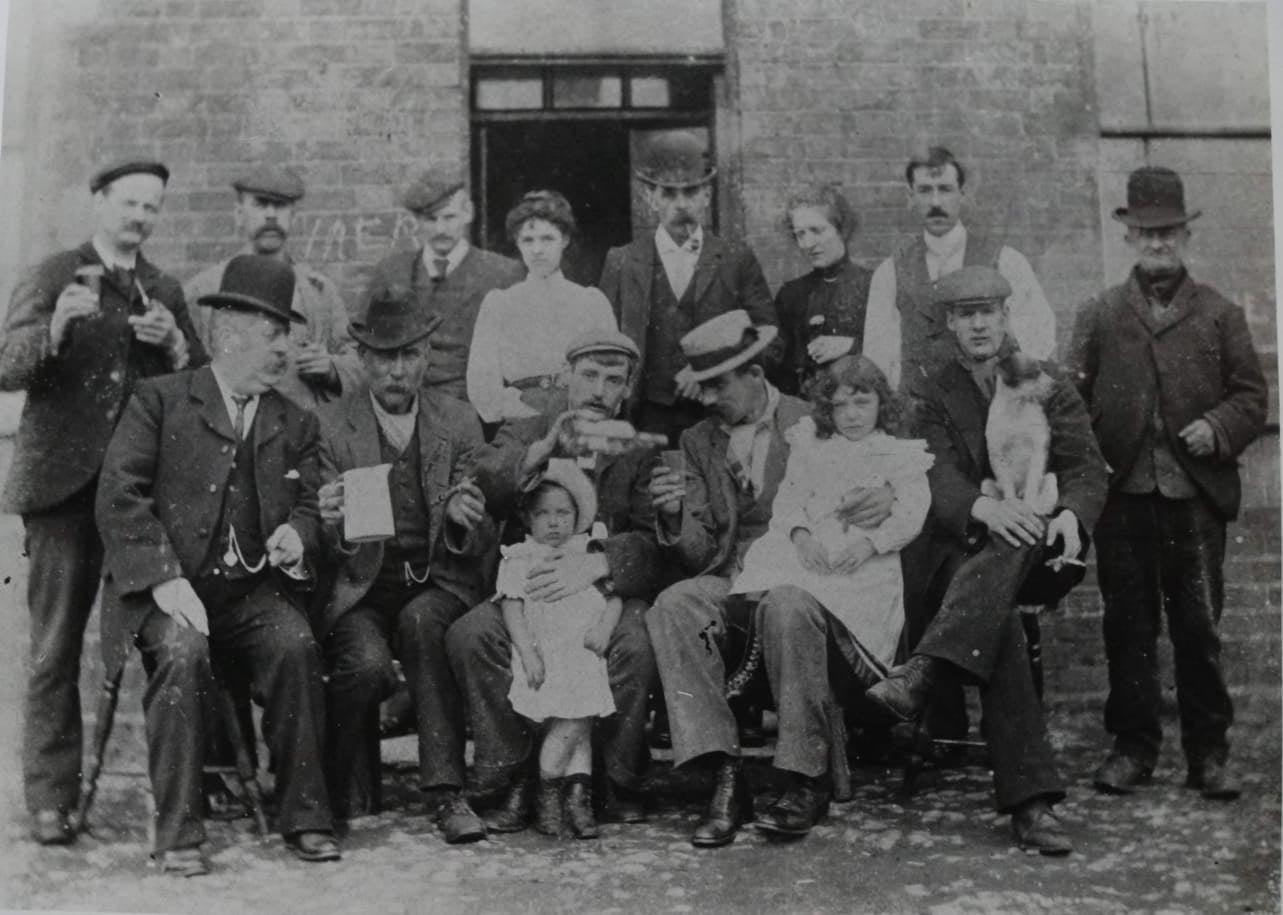
Kate Rushby’s story as told by her grandson Mike:
George’s daughter Catherine (Kate) Purdy grew up in Eastwood and was living at Walnut Tree Lane when, at the age of 21, and on the 24 Sep 1894, she married John Henry Payling Rushby who was a policeman in the Grimsby Police. John Henry left the Police and together they bought a public house “The Three Tuns Inn” at Beggarlee. The establishment was frequented by amongst others, the writer D.H.Lawrence who wrote much of his book “Sons and Lovers” in the Inn. In his book he calls the Inn “The Moon and Stars” and mentions Kate. though not by name.
John Henry Rushby had two children, Charlotte and George Gilman Rushby. But a year after the birth of George on 28 Feb 1900, John Henry died at the age of thirty on 13 Sep 1901. He liked to show off his strength to his friends by lifting above his head an oak barrel full of beer. This would have weighed almost 200 kilograms. “He bust his gut” Kate said. He died of peritonitis following a hernia.
Following the death of John Henry, Kate managed the Three Tuns Inn on her own. But a regular visitor to the Inn was Frank Freer who was a singer and used to entertain the patrons with his fine baritone voice and by playing the cornet. He and Kate got married, but he turned out to be a drunk who beat his wife and was cruel to her son. They separated and he died from alcoholism, though he may also have been struck on the head with a beer bottle by a person unknown. She then married Mr Gregory Simpson who fathered a daughter Catherine, and then died from gas injuries he suffered on the battlefield in the first world war.
Despite her lack of men able to stay the course, Catherine became a very successful business woman. She ran the Three Tuns Inn and later moved to Jacksdale where she owned ”ThePortland Arms Hotel”. She travelled extensively to Europe in times of peace, to Africa several times, and around England frequently. She settled in Selston Lane Jacksdale in a large house bracketed by the homes of her daughters Lottie and Cath. She was a strong and tenacious woman who became the surrogate mother of her grandchildren Ann and George when they were separated from their parents by the second world war.
Mike Rushby’s photo of Kate:
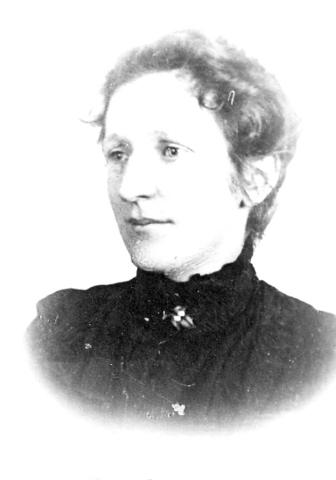 December 13, 2021 at 11:29 am #6222
December 13, 2021 at 11:29 am #6222In reply to: The Elusive Samuel Housley and Other Family Stories
George Gilman Rushby: The Cousin Who Went To Africa
The portrait of the woman has “mother of Catherine Housley, Smalley” written on the back, and one of the family photographs has “Francis Purdy” written on the back. My first internet search was “Catherine Housley Smalley Francis Purdy”. Easily found was the family tree of George (Mike) Rushby, on one of the genealogy websites. It seemed that it must be our family, but the African lion hunter seemed unlikely until my mother recalled her father had said that he had a cousin who went to Africa. I also noticed that the lion hunter’s middle name was Gilman ~ the name that Catherine Housley’s daughter ~ my great grandmother, Mary Ann Gilman Purdy ~ adopted, from her aunt and uncle who brought her up.
I tried to contact George (Mike) Rushby via the ancestry website, but got no reply. I searched for his name on Facebook and found a photo of a wildfire in a place called Wardell, in Australia, and he was credited with taking the photograph. A comment on the photo, which was a few years old, got no response, so I found a Wardell Community group on Facebook, and joined it. A very small place, population some 700 or so, and I had an immediate response on the group to my question. They knew Mike, exchanged messages, and we were able to start emailing. I was in the chair at the dentist having an exceptionally long canine root canal at the time that I got the message with his email address, and at that moment the song Down in Africa started playing.
Mike said it was clever of me to track him down which amused me, coming from the son of an elephant and lion hunter. He didn’t know why his father’s middle name was Gilman, and was not aware that Catherine Housley’s sister married a Gilman.
Mike Rushby kindly gave me permission to include his family history research in my book. This is the story of my grandfather George Marshall’s cousin. A detailed account of George Gilman Rushby’s years in Africa can be found in another chapter called From Tanganyika With Love; the letters Eleanor wrote to her family.
George Gilman Rushby:

The story of George Gilman Rushby 1900-1969, as told by his son Mike:
George Gilman Rushby:
Elephant hunter,poacher, prospector, farmer, forestry officer, game ranger, husband to Eleanor, and father of 6 children who now live around the world.George Gilman Rushby was born in Nottingham on 28 Feb 1900 the son of Catherine Purdy and John Henry Payling Rushby. But John Henry died when his son was only one and a half years old, and George shunned his drunken bullying stepfather Frank Freer and was brought up by Gypsies who taught him how to fight and took him on regular poaching trips. His love of adventure and his ability to hunt were nurtured at an early stage of his life.
The family moved to Eastwood, where his mother Catherine owned and managed The Three Tuns Inn, but when his stepfather died in mysterious circumstances, his mother married a wealthy bookmaker named Gregory Simpson. He could afford to send George to Worksop College and to Rugby School. This was excellent schooling for George, but the boarding school environment, and the lack of a stable home life, contributed to his desire to go out in the world and do his own thing. When he finished school his first job was as a trainee electrician with Oaks & Co at Pye Bridge. He also worked part time as a motor cycle mechanic and as a professional boxer to raise the money for a voyage to South Africa.In May 1920 George arrived in Durban destitute and, like many others, living on the beach and dependant upon the Salvation Army for a daily meal. However he soon got work as an electrical mechanic, and after a couple of months had earned enough money to make the next move North. He went to Lourenco Marques where he was appointed shift engineer for the town’s power station. However he was still restless and left the comfort of Lourenco Marques for Beira in August 1921.
Beira was the start point of the new railway being built from the coast to Nyasaland. George became a professional hunter providing essential meat for the gangs of construction workers building the railway. He was a self employed contractor with his own support crew of African men and began to build up a satisfactory business. However, following an incident where he had to shoot and kill a man who attacked him with a spear in middle of the night whilst he was sleeping, George left the lower Zambezi and took a paddle steamer to Nyasaland (Malawi). On his arrival in Karongo he was encouraged to shoot elephant which had reached plague proportions in the area – wrecking African homes and crops, and threatening the lives of those who opposed them.
His next move was to travel by canoe the five hundred kilometre length of Lake Nyasa to Tanganyika, where he hunted for a while in the Lake Rukwa area, before walking through Northern Rhodesia (Zambia) to the Congo. Hunting his way he overachieved his quota of ivory resulting in his being charged with trespass, the confiscation of his rifles, and a fine of one thousand francs. He hunted his way through the Congo to Leopoldville then on to the Portuguese enclave, near the mouth of the mighty river, where he worked as a barman in a rough and tough bar until he received a message that his old friend Lumb had found gold at Lupa near Chunya. George set sail on the next boat for Antwerp in Belgium, then crossed to England and spent a few weeks with his family in Jacksdale before returning by sea to Dar es Salaam. Arriving at the gold fields he pegged his claim and almost immediately went down with blackwater fever – an illness that used to kill three out of four within a week.
When he recovered from his fever, George exchanged his gold lease for a double barrelled .577 elephant rifle and took out a special elephant control licence with the Tanganyika Government. He then headed for the Congo again and poached elephant in Northern Rhodesia from a base in the Congo. He was known by the Africans as “iNyathi”, or the Buffalo, because he was the most dangerous in the long grass. After a profitable hunting expedition in his favourite hunting ground of the Kilombera River he returned to the Congo via Dar es Salaam and Mombassa. He was after the Kabalo district elephant, but hunting was restricted, so he set up his base in The Central African Republic at a place called Obo on the Congo tributary named the M’bomu River. From there he could make poaching raids into the Congo and the Upper Nile regions of the Sudan. He hunted there for two and a half years. He seldom came across other Europeans; hunters kept their own districts and guarded their own territories. But they respected one another and he made good and lasting friendships with members of that small select band of adventurers.
Leaving for Europe via the Congo, George enjoyed a short holiday in Jacksdale with his mother. On his return trip to East Africa he met his future bride in Cape Town. She was 24 year old Eleanor Dunbar Leslie; a high school teacher and daughter of a magistrate who spent her spare time mountaineering, racing ocean yachts, and riding horses. After a whirlwind romance, they were betrothed within 36 hours.
On 25 July 1930 George landed back in Dar es Salaam. He went directly to the Mbeya district to find a home. For one hundred pounds he purchased the Waizneker’s farm on the banks of the Mntshewe Stream. Eleanor, who had been delayed due to her contract as a teacher, followed in November. Her ship docked in Dar es Salaam on 7 Nov 1930, and they were married that day. At Mchewe Estate, their newly acquired farm, they lived in a tent whilst George with some help built their first home – a lovely mud-brick cottage with a thatched roof. George and Eleanor set about developing a coffee plantation out of a bush block. It was a very happy time for them. There was no electricity, no radio, and no telephone. Newspapers came from London every two months. There were a couple of neighbours within twenty miles, but visitors were seldom seen. The farm was a haven for wild life including snakes, monkeys and leopards. Eleanor had to go South all the way to Capetown for the birth of her first child Ann, but with the onset of civilisation, their first son George was born at a new German Mission hospital that had opened in Mbeya.
Occasionally George had to leave the farm in Eleanor’s care whilst he went off hunting to make his living. Having run the coffee plantation for five years with considerable establishment costs and as yet no return, George reluctantly started taking paying clients on hunting safaris as a “white hunter”. This was an occupation George didn’t enjoy. but it brought him an income in the days when social security didn’t exist. Taking wealthy clients on hunting trips to kill animals for trophies and for pleasure didn’t amuse George who hunted for a business and for a way of life. When one of George’s trackers was killed by a leopard that had been wounded by a careless client, George was particularly upset.
The coffee plantation was approaching the time of its first harvest when it was suddenly attacked by plagues of borer beetles and ring barking snails. At the same time severe hail storms shredded the crop. The pressure of the need for an income forced George back to the Lupa gold fields. He was unlucky in his gold discoveries, but luck came in a different form when he was offered a job with the Forestry Department. The offer had been made in recognition of his initiation and management of Tanganyika’s rainbow trout project. George spent most of his short time with the Forestry Department encouraging the indigenous people to conserve their native forests.In November 1938 he transferred to the Game Department as Ranger for the Eastern Province of Tanganyika, and over several years was based at Nzasa near Dar es Salaam, at the old German town of Morogoro, and at lovely Lyamungu on the slopes of Kilimanjaro. Then the call came for him to be transferred to Mbeya in the Southern Province for there was a serious problem in the Njombe district, and George was selected by the Department as the only man who could possibly fix the problem.
Over a period of several years, people were being attacked and killed by marauding man-eating lions. In the Wagingombe area alone 230 people were listed as having been killed. In the Njombe district, which covered an area about 200 km by 300 km some 1500 people had been killed. Not only was the rural population being decimated, but the morale of the survivors was so low, that many of them believed that the lions were not real. Many thought that evil witch doctors were controlling the lions, or that lion-men were changing form to kill their enemies. Indeed some wichdoctors took advantage of the disarray to settle scores and to kill for reward.
By hunting down and killing the man-eaters, and by showing the flesh and blood to the doubting tribes people, George was able to instil some confidence into the villagers. However the Africans attributed the return of peace and safety, not to the efforts of George Rushby, but to the reinstallation of their deposed chief Matamula Mangera who had previously been stood down for corruption. It was Matamula , in their eyes, who had called off the lions.
Soon after this adventure, George was appointed Deputy Game Warden for Tanganyika, and was based in Arusha. He retired in 1956 to the Njombe district where he developed a coffee plantation, and was one of the first in Tanganyika to plant tea as a major crop. However he sensed a swing in the political fortunes of his beloved Tanganyika, and so sold the plantation and settled in a cottage high on a hill overlooking the Navel Base at Simonstown in the Cape. It was whilst he was there that TV Bulpin wrote his biography “The Hunter is Death” and George wrote his book “No More The Tusker”. He died in the Cape, and his youngest son Henry scattered his ashes at the Southern most tip of Africa where the currents of the Atlantic and Indian Oceans meet .
George Gilman Rushby:
 December 13, 2021 at 11:07 am #6221
December 13, 2021 at 11:07 am #6221In reply to: The Elusive Samuel Housley and Other Family Stories
Mary Ann Gilman Purdy
1880-1950
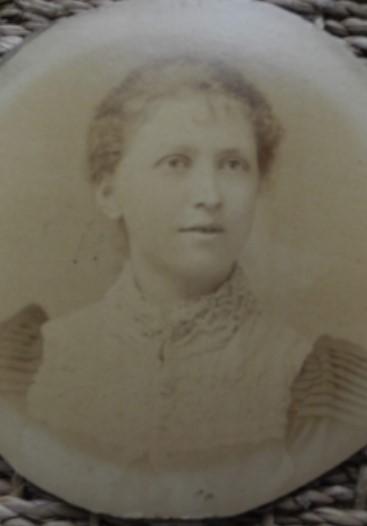
Mary Ann was my grandfather George Marshall’s mother. She died in 1950, seven years before I was born. She has been referred to more often than not, since her death, as Mary Ann Gilman Purdy, rather than Mary Marshall. She was from Buxton, so we believed, as was her husband William Marshall. There are family photos of the Gilmans, grocers in Buxton, and we knew that Mary Ann was brought up by them. My grandfather, her son, said that she thought very highly of the Gilman’s, and added the Gilman name to her birth name of Purdy.
The 1891 census in Buxton:

(Mary Ann’s aunt, Mrs Gilman, was also called Mary Anne, but spelled with an E.)
Samuel Gilman 1846-1909, and Mary Anne (Housley) Gilman 1846-1935, in Buxton:
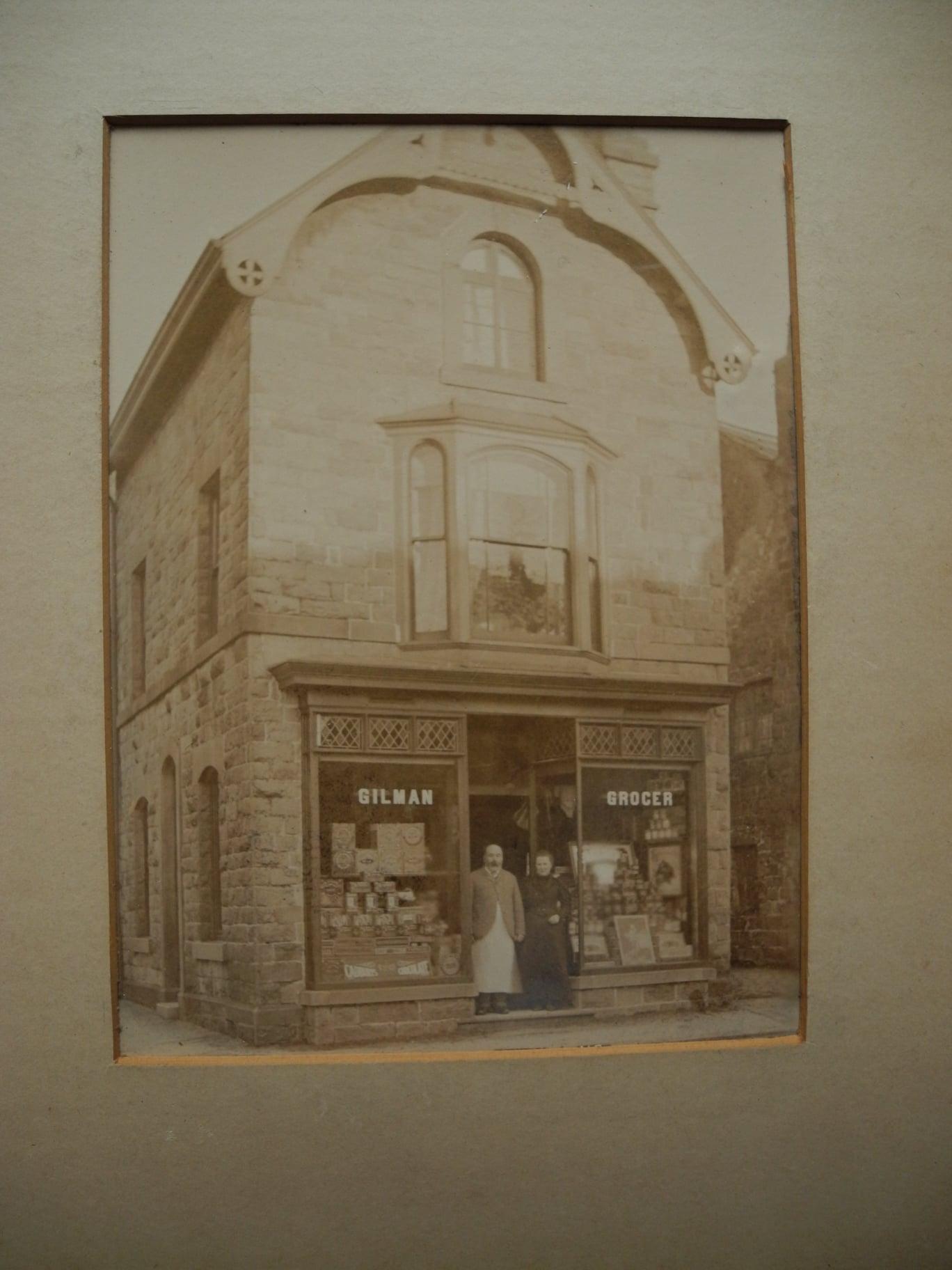
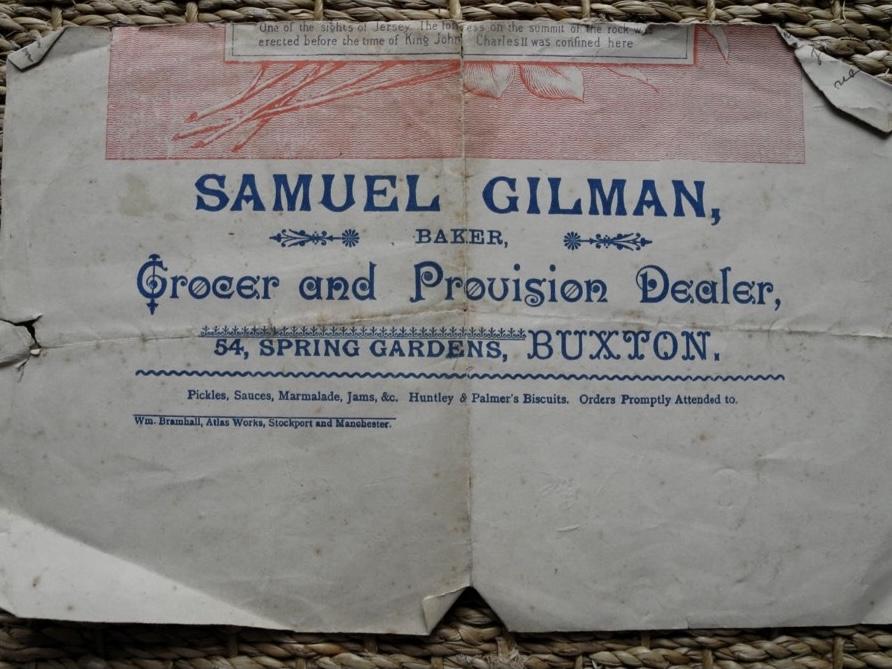
What we didn’t know was why Mary Ann (and her sister Ellen/Nellie, we later found) grew up with the Gilman’s. But Mary Ann wasn’t born in Buxton, Derbyshire, she was born in Eastwood, Nottinghamshire. When the search moved to Nottingham, we found the Purdy’s.
George Purdy 1848-1935, Mary Ann’s father:
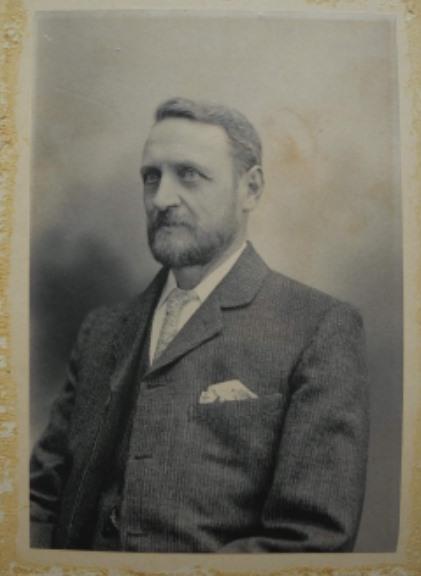
Mary Ann’s parents were George Purdy of Eastwood, and Catherine Housley of Smalley.
Catherine Housley 1849-1884, Mary Ann’s mother:
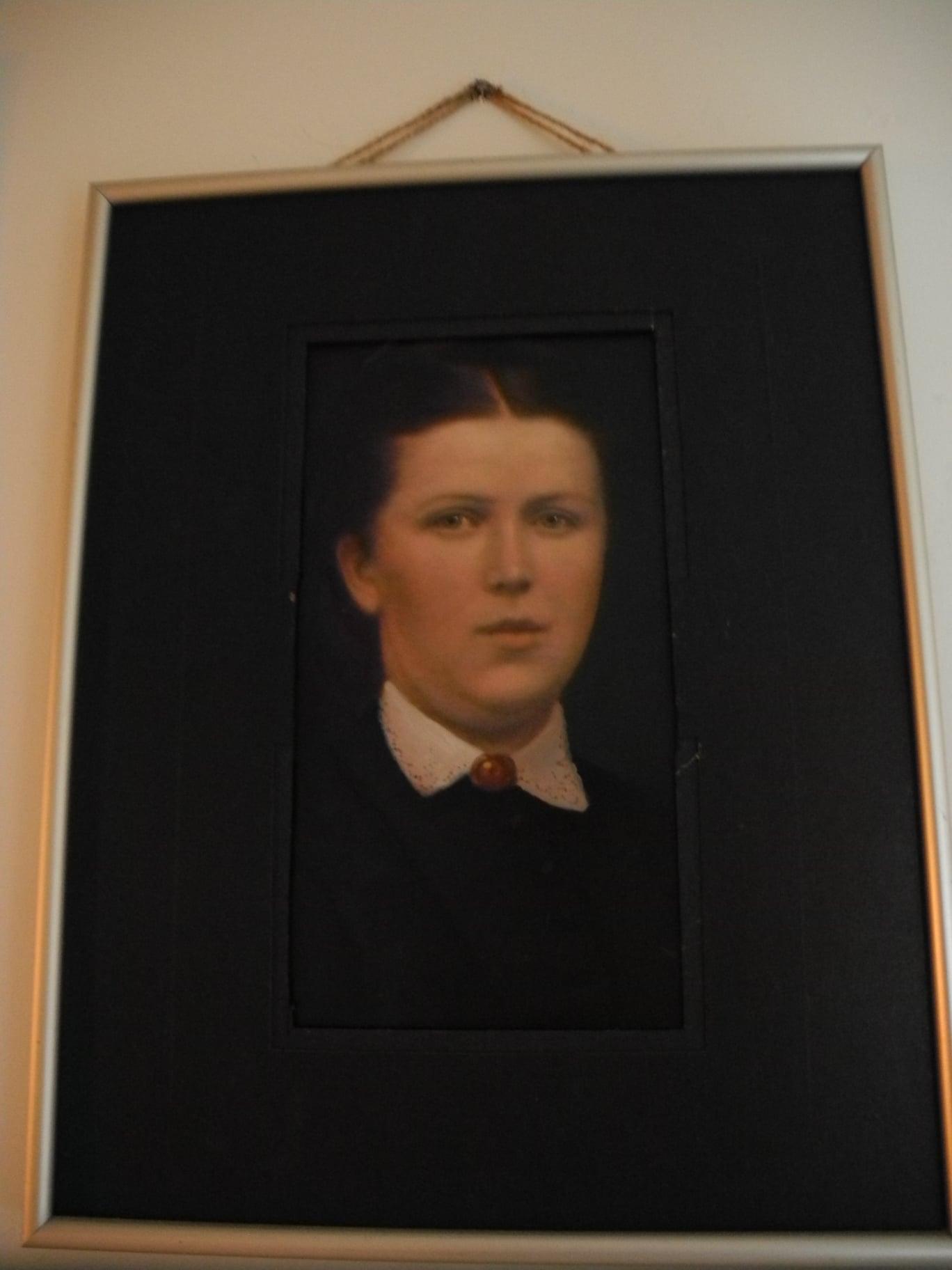
Mary Ann was four years old when her mother died. She had three sisters and one brother. George Purdy remarried and kept the two older daughters, and the young son with him. The two younger daughters, Mary Ann and Nellie, went to live with Catherine’s sister, also called Mary Anne, and her husband Samuel Gilman. They had no children of their own. One of the older daughters who stayed with their father was Kate , whose son George Gilman Rushby, went to Africa. But that is another chapter.
George was the son of Francis Purdy and his second wife Jane Eaton. Francis had some twenty children, and is believed in Eastwood to be the reason why there are so many Purdy’s.
The woman who was a mother to Mary Ann and who she thought very highly of, her mothers sister, spent her childhood in the Belper Workhouse. She and her older sister Elizabeth were admitted in June, 1850, the reason: father in prison. Their mother had died the previous year. Mary Anne Housley, Catherine’s sister, married Samuel Gilman, and looked after her dead sisters children.
Mary Ann Gilman Purdy Marshalls recipes written on the back of the Gilmans Grocers paper:
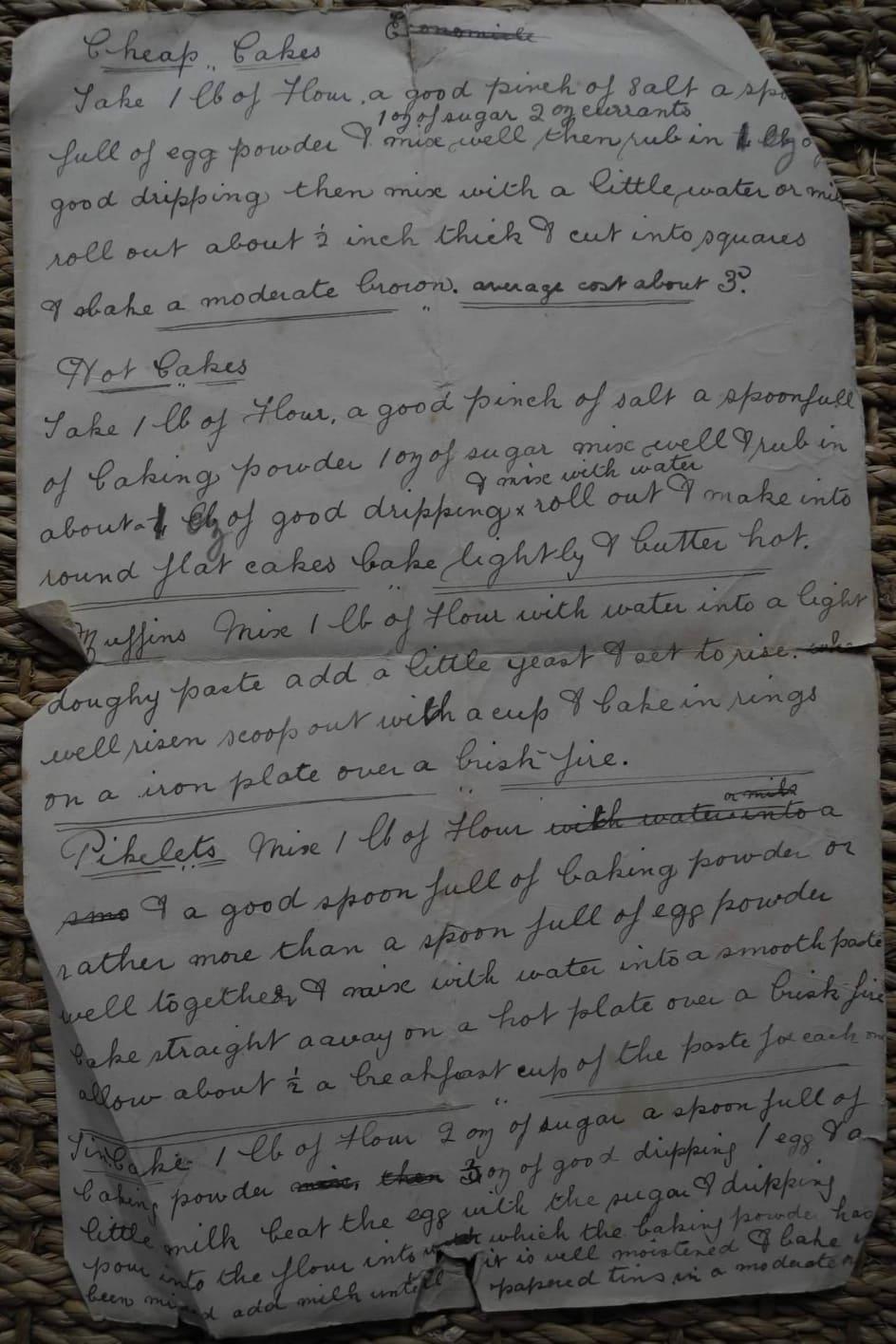 May 30, 2021 at 8:19 am #6197
May 30, 2021 at 8:19 am #6197In reply to: The Precious Life and Rambles of Liz Tattler
“We need fun silly comments like watermelon in the woodshed and cork bums,” said Liz, to anyone who was listening. “More of that sort of thing.”
“You start,” said Finnley.
April 24, 2021 at 8:02 pm #6193In reply to: The Whale’s Diaries Collection
I hope all this social media as they call it stands the test of time because little things like this are priceless and so few and far between, and someday someone wants to know a little thing like this to paint a picture in their mind. I don’t know if this is one of ours as they say but but he was there too and could even have been one of you or another one of me, the possibilities are endless and the charm of the random snippet is boundless.
“The gallery stairs were honeycombed on
each side by old Jonathan Beniston’s spiked
crutches, and although Jonathan could not
read, he considered himself a valuable
addition to the choir, contributing a sort of
drone bass accompaniment to the melodies. after the style of a bagpipe ” chanter.”Here’s another one I want to include in my book:
Mr. Joseph Moss, formerly a framework knitter of Woodhouse Lane, for several years kept a Diary of the principal events and incidents in the locality: a most commendable undertaking. It is much to be regretted that so few attempt anything of the kind, so useful, and always interest- ing. Besides the registration of marriages and funerals, we have notices of storms, removals, accidents, sales, robberies, police captures, festivities, re-openings of churches, and many other matters. His record begins in 1855, ^^d ends in 1881, Mr. Moss was a violinist of some ability, and was in great demand at all rural festivities. He was a good singer, and sang (inter alia) ” The Beggar’s Ramble ” with his own local variations^ in good style, and usually with much eclat. The following are a few extracts from his Diary : —
” — July. Restoration of Horsley Church. New weathercock placed on spire by Charles, son of Mr. Anthony Kerry, the builder, on the 31st. A few days later, the south arches of the nave fell down, bringing with it the roofs of nave and south aisle. The pillar next the tower had been under- mined by the making of a grave, and as soon as the gravestone over it was moved the column began to settle : a loud shout was made, and the workmen had only just time to scamper out of the building before the roof and top windows and all came down.”
February 6, 2021 at 1:23 pm #6185In reply to: Twists and One Return From the Time Capsule
“I’ll be right back!” Nora told Will, who was stirring a big bubbling pot on the stove. “Need to wash my hands.”
She had a quick look around the bedroom she’d slept in for her missing phone. Nowhere to be found! Maybe she could find Will’s phone when he went out to feed the donkey, and call her phone to try and locate it. Damn, that wouldn’t work either. Will had said there was no network here. That would explain why her phone stopped working when she was alone in the dark woods.
“Smells delicious!” she said brightly, scraping a chair back across the brick floor and seating herself at the kitchen table.
The home made soup was chock full of vegetables and looked and smelled wonderful, but it had a peculiar acrid aftertaste. Nora tried to ignore it, taking gulps of wine in between each mouthful to eliminate the bitterness. She wished it wasn’t soup in a way, so that she’d be able to surreptitiously palm some of it off onto the dogs that were waiting hopefully under the table. If only Will would leave the room for a minute, but he seemed to be watching her every move.
“Very tasty, but I can’t manage another mouthful, it’s so filling,” she said, but Will looked so offended that she sighed and carried on eating. He topped up her wine glass.
By the time Nora had finished the soup, she felt quite nauseous and stood up quickly to head for the bathroom. The room started to spin and she held on to the edge of the table, but it was no good. The spinning didn’t stop and she crashed to the floor, unconscious.
Smiling with satisfaction, Will stood up and walked around the table to where she lay. Shame he’d had to put her to sleep, really she was quite a nice woman and cute, too, in a funny elfin way. He’d started to like her. Plenty of time to get to know her now, anyway. She wouldn’t be going anywhere for awhile.
He picked her up and carried her to the secret room behind his workshop on the other side of the patio. The walls and floor were thick stone, and there were no windows. He laid her on the bench, locked the door, and went back in the house to fetch blankets and bedding and a pile of books for her to read when she came round. Probably not for a good 24 hours he reckoned, somehow she’d managed to eat all the soup. He would put much less in the next batch, just enough to keep her docile and sleepy.
It would only be for a few days, just long enough for him to find that box and move it to a safer location. He’d been entrusted to make sure the contents of the box were preserved for the people in the future, and he was a man of his word.
If they had listened to him in the first place this would never have happened. Burying a box was a risk: all kinds of possibilities existed for a buried box to be accidentally unearthed. He had suggested encasing the contents inside a concrete statue, but they’d ignored him. Well, now was his chance. He was looking forward to making a new statue.
December 23, 2020 at 8:48 pm #6171In reply to: Twists and One Return From the Time Capsule
Nora was relieved when the man with the donkey knew her name and was expecting her. She assumed that Clara had made contact with him, but when she mentioned her friend, he shook his head with a puzzled frown. I don’t know anyone called Clara, he said. Here, get yourself up on Manolete, it’ll be easier if you ride. We’ll be home in half an hour.
The gentle rhythmic rocking astride the donkey soothed her as she relaxed and observed her surroundings. The woods had opened out into a wide path beside an orchard. Nora felt the innocuous hospitability of the orchard in comparison to the unpredictability of the woods, although she felt that idea would require further consideration at a later date. One never knew how much influence films and stories and the like had on one’s ideas, likely substantial, Nora thought ~ another consideration not lost on Nora was the feeling of safety she had now that she wasn’t alone, and that she was with someone who clearly knew where he was going.
Notwithstanding simultaneous time, Nora wondered which came first ~ the orchard, the man with the donkey, or the feeling of safety and hospitability itself?
It was me, said the man leading the donkey, turning round with a smile. I came first. Remember?
December 14, 2020 at 9:10 pm #6161In reply to: Twists and One Return From the Time Capsule
Dispersee sat on a fallen tree trunk, lost in thought. A long walk in the woods had seemed just the ticket……
Nora wasn’t surprised to encounter a fallen tree trunk no more than 22 seconds after the random thought wafted through her mind ~ if thought was was the word for it ~ about Dispersee sitting on a fallen tree trunk. Nora sat on the tree trunk ~ of course she had to sit on it; how could she not ~ simultaneously stretching her aching back and wondering who Dispersee might be. Was it a Roman name? Something to do with the garum on the shopping receipt?
Nora knew she wasn’t going to get to the little village before night fall. Her attempts to consult the map failed. It was like a black hole. No signal, no connection, just a blank screen. She looked up at the sky. The lowering dark clouds were turning orange and red as the sun went down behind the mountains, etching the tree skeletons in charcoal black in the middle distance.
In a sudden flash of wordless alarm, Nora realized she was going to be out alone in the woods at night and wild boars are nocturnal and a long challenging walk in broad daylight was one thing but alone at night in the woods with the wild boars was quite another, and in a very short time indeed had worked herself up into a state approaching panic, and then had another flash of alarm when she realized she felt she would swoon in any moment and fall off the fallen trunk. The pounding of her, by then racing, heartbeats was yet further cause for alarm, and as is often the case, the combination of factors was sufficiently noteworthy to initiate a thankfully innate ability to re establish a calm lucidity, and pragmatic attention to soothe the beating physical heart as a matter of priority.
It was at the blessed moment of restored equilibrium and curiosity (and the dissipation of the alarm and associated malfunctions) that the man appeared with the white donkey.
December 13, 2020 at 8:14 am #6159In reply to: Twists and One Return From the Time Capsule
Nora moves silently along the path, placing her feet with care. It is more overgrown in the wood than she remembers, but then it is such a long time since she came this way. She can see in the distance something small and pale. A gentle gust of wind and It seems to stir, as if shivering, as if caught.
Nora feels strange, there is a strong sense of deja vu now that she has entered the forest.
She comes to a halt. The trees are still now, not a leaf stirs. She can hear nothing other than the sound of her own breathing. She can’t see the clearing yet either, but she remembers it’s further on, beyond the next winding of the path. She can see it in her mind’s eye though, a rough circle of random stones, with a greenish liquid light filtering through. The air smells of leaf mould and it is spongy underfoot. There’s a wooden bench, a grassy bank, and a circular area of emerald green moss. Finn thinks of it as place of enchantment, a fairy ring.
Wait! Who is Finn? Where is this story coming from that whispers in her ear as she makes her way through the woods to her destination, the halfway point of her clandestine journey? Who is Finn?
She reaches the tiny shivering thing and sees that it is a scrap of paper, impaled on a broken branch. She reaches out gently and touches it, then eases if off the branch, taking care not to rip it further. There is a message scribbled on the paper, incomplete. meet me, is all it says now
The crumpled up paper among the dead leaves beside the path catches her eye. No, not impaled on a branch but still, a bit of paper catches her eye as the mysterious ~ ephemeral, invisible ~ story teller continues softly telling her tale
Finn feels dreamy and floaty. She smiles to herself, thinking of the purpose of her mission, feeling as though it is a message to her from the past. She is overwhelmed for a moment with a sense of love and acceptance towards her younger self. Yes, she whispers softly to the younger Finn, I will meet you at the fairy ring. We will talk a bit. Maybe I can help
But wait, there is no meaningful message on the crumpled paper that Nora picks up and opens out. It’s nothing but a shopping receipt. Disappointed, she screws it back up and aims to toss it into the undergrowth, but she hesitates. Surely it can’t have no meaning at all, she thinks, not after the strange whispered story and the synchronicity of finding it just at that moment. She opens it back up again, and reads the list of items.
Olive oil, wine, wheat, garum…. wait, what? Garum? She looks at the date on the receipt ~ a common enough looking till roll receipt, the kind you find in any supermarket ~ but what is this date? 57BC? How can that be? Even if she had mistranslated BC ~ perhaps it means British Cooperative, or Better Compare or some such supermarket name ~ the year of 57 makes little sense anyway. And garum, how to explain that! Nora only knows of garum in relation to Romans, there is no garum on the shelves between the mayonaisse and the ketchup these days, after all.
Nora smooths the receipt and folds it neatly in half and puts it in her pocket. The shadows are long now and she still has some distance to walk before the halfway village. As she resumes her journey, she hears whispered in her ear: You unlocked the blue diamond mode. You’re on a quest now!
Smiling now, she accelerates her pace. The lowering sun is casting a golden light, and she feels fortified.
November 5, 2020 at 3:44 am #6144In reply to: Two Aunties au Pair and Their Pert Carouses
“You know, April … I’ve never felt myself suited to work. Never found my …” June screwed up her face in concentration. “… special calling.”
“Can’t we sit down over there for a minute? My feet are bloody killing me.” April nodded towards a park bench; she didn’t have much patience today for June and her philosophising, after all, wasn’t it June’s fault they were in this mess? “It’s too bad we can’t even afford the bus fare,” she grumbled as she settled herself on the wooden seat.
“Not too much further,” said June plonking down next to her.
April bent down to take off her socks and sneakers and massaged her grateful feet in the damp grass. “Think I’ve got a blister. And I’d kill for a cuppa tea. I do hope Finnley has kept on top of things.”
June snorted. “Not bloody likely. Anyway, while we’ve been walking I’ve been thinking … what if we sue?”
April yawned noisily without bothering to put a hand over her mouth—she knew June hated that. “Who is Sue? Does she have money?”
“No, you idiot, not, who Sue. I mean what if we sue for money? Sue the president for wrongdoings which have been done to us.”
“Oh!” April perked up. “There’s certainly been plenty of wrongdoings!”
June smiled smugly. “Exactly.”
April 28, 2020 at 9:15 am #6078In reply to: Seven Twines and the Dragon Heartwoods
“You really know your trade, Fuyi,” said Rukshan. “You’ve built the most exquisite and comfortable place. And I think the empty dishes speak aplenty about the quality of the food and the pleasure we took in this shared meal. Now, let us help you with the dishes,” said Rukshan.
“Ach! Don’t be so polite,” said Fuyi. “I’ll have plenty of time after yar departure tomorrow. It’s not like the inn is full. Just enjoy an evening together, discuss yar plans, and have some rest. I know that life. Take the chance when it presents itself!”
Rushan nodded and looked at Kumihimo. Fox sighed with relief. His belly was full and round, and he didn’t want to disturbed his digestion with some chore.
The Sinese food made by the innkeeper had been delicious and quite a first for most of them. Tak had particularly enjoyed the crunchy texture of the stir fried vegetables flavoured with the famous five spices sauce. Nesy had preferred the algae and chili dishes while Fox, who ate a red hot pepper thinking it was bell pepper, had stuffed himself with juicy pork buns to put out the fire in his mouth.
Gorrash, befuddled by the novelty, had been at a loss of labels, good or bad. He simply chose to welcome the new experiences and body reactions to flavours and textures. As for Olliver, he gave up the chopsticks when he saw how fast Fox made the food disappear from the dishes.
Now that the dishes were empty, the children and Gorrash had left the table and were playing near the fireplace. Olliver was looking at the trio with envy, split between the desire to play and enjoy the simplicity of the moment, and the desire to be taken more seriously which meant participate in the conversation with the adults.
“We have plenty to discuss, Fae,” said Kumihimo.
Fuyi looked at Olliver, recognising the conundrum. “That’s settled, then,” he said to the group. Then turning toward Olliver: “Boy! I’m sure the start of the conversation will be boring for a young mind. Let’s join the others for a story of my own. You can still come back later and they’ll fill you in on the details.”
Fuyi and Olliver moved to the fireplace. The innkeeper threw cushions on the floor and sat on a wooden rocking chair. At the mention of a story, Tak, Nesy and Gorrash couldn’t contain their exuberant joy and gathered all ears around Admirable Fuyi. As he rocked, the chair creaked. He waited until they all calmed down. And when he was satisfied he started.
“I was young and still a fresh recruit in the Sinese army,” started Fuyi. “We were stationed at the western frontier just below the high plateaus and I hadn’t participated in any battle yet. With the folly of youth I thought that our weapons and the bond we shared with my fellow soldiers were enough to defeat anything.”
April 19, 2020 at 11:27 am #6064In reply to: The Whale’s Diaries Collection
I’ve been up since god knows what time. Got up for the loo and couldn’t face going back to the awful nightmares. That girl that came yesterday said she’d been having nightmares, she said it was common now, people having nightmares, what with the quarantine. I think I might have just snorted at the silly girl, but when I woke up last night I wondered if it was true. Or maybe I’m just a suggestible old fool.
Anyway, I stayed up because lord knows I don’t want to be in a city in America at night, not waking and not dreaming either. I’ve had a feeling for a long time, and much longer than this virus, that it was like a horror movie and it would behoove me not to watch it anymore or I’d be having nightmares. I didn’t stop watching though, sort of a horrified fascination, like I’d watched this far so why stop now.
In the dream I was on a dark city street at a bus stop, it was night time and the lights were bright in a shop window on the other side of the sidewalk. I had a bunch of tickets in my hand all stapled together, but they were indecipherable. I had no idea where I was going or how to get there. Then I noticed the man that was by my side, a stranger that seemed to have latched on to me, had stolen all my tickets and replaced them with the rolled up used ticket stubs. I made him give me back my tickets but then I knew I couldn’t trust him.
Then I realized I hadn’t finished packing properly and only had a ragged orange towel with bloodstains on it. So I go back home (I say home but I don’t know what house it was) to pack my bags properly, and find a stack of nice new black towels, and replace the bloody orange one.
I’m walking around the house, wondering what else I should pack, and one room leads into another, and then another, and then another, in a sort of spiral direction (highly improbable because you’d have ended up back in the same room, in real life) and then I found a lovely room and thought to myself, What a nice room! You’d never have known it was there because it wasn’t on the way to anywhere and didn’t seem to have a function as a room.
It was familiar and I remembered I’d been there before, in another dream, years ago. It had lovely furniture in it, big old polished wooden pieces, but not cluttered, the room was white and bright and spacious. Lovely big old bureau on one wall, I remember that piece quite clearly. Not a speck of dust on it and the lovely dark sheen of ancient polished oak.
Anyway in the dream I didn’t take anything from the room, and probably should have just stayed there but the next thing I know, I’m in a car with my mother and she races off down the fast lane of an empty motorway. I’m thinking, surely she doesn’t know how to take me where I have to go? She seemed so confident, so out of character the way she was driving.
I got up for the loo and all I kept thinking about was that awful scene in the city street, which admittedly doesn’t sound that bad. I won’t bother telling the girl about it when she comes to do my breakfast, it loses a little in the telling, I think.
But the more I think about that lovely room at the end of the spiral of rooms, the more I’m trying to wrack my brains to remember where I’ve seen that room before. I’ve half a mind to go back there and open that dark oak bureau and see what’s inside.
April 19, 2020 at 10:42 am #6063In reply to: Scrying the Word Cloud
turning head high roberto needed kitchen breath
star kept thread gave woods fox
mine taste mad
told vince next normal change
April 18, 2020 at 1:42 pm #6044In reply to: Seven Twines and the Dragon Heartwoods
They had to stop to get some rest. Rukshan knew the signs, the song of a black swan, a nesting bear in the forest, cubic clouds… All strange omens not to be taken lightly. He told the others they’d better find shelter somewhere and not spend the night outside.
As soon had he make the announcement that he saw the relief on their faces. They’d been enthusiastic for half a day, but the monotony of walking got the better of their motivation, especially the kids who were not used to such long journeys out of the cottage’s safety.
Fortunately they were not far from the Sooricat Inn, a place lost in the woods, it still had four walls, warm food and almost certainly a hot bath. Let’s just hope they’re open, thought the Fae.
When they arrived, the owner, an old man from Sina, looked at them suspiciously.
“Ya’ll have your attestation? I can’t believe ya’re all family. Don’t think I’m a fool, ya’re a Fae, and this little fella there, he’s smaller than the children but has a beard. Never saw anything like him,” he said with rumbling r’s pointing at the children and Gorrash with his chin. The dwarf seemed offended but a stern look from Rukshan prevented him from speaking.
“Anyway,” continued the innkeeper, “I can just sell ya food. Not’ing parsonal. That’s rooles, ya’know with the all stayin’at home thing from Gavernor Leraway, I can not even let ya’in. Ya can buy food and eat it outside if ya want.”
“Look, it’s almost twilight,” said Rukshan. “We’ve walked the whole day, the children are exhausted.”
Tak and Nesy showed their best puppy face, risking to make Fox burst into laughter. That seemed to soften the man a little.
“Oh! I really shouldn’t. I don’t like breaking rooles.”
“I knew you more daring, Admirable Fuyi,” said a booming voice coming from behind them. They all turned around to see Kumihimo. She was wearing a cloak made of green and yellow gingko leaves, her silvery white hair, almost glowing in the dark, cascading beautifully on her shoulders. A grey cat strode alongside her.
“Oh! that’s just the donkey, Ronaldo. It got transformed into a cat after walking directly into a trap to get one of those darn carrots. He knew better, don’t pity him. He got what he deserved.” Kumihimo’s rant got a indignant meow, close to a heehaw, from Ronaldo.
“Kumi! I can’t believe it’s ya!” said the innkeeper.
“You two know each others?” asked Rukshan.
“It’s a long story,” said the innkeeper, “From when I was serving in Sina’s army, we had conquered the high plateaus. I gave up the title of Admirable when I left the army. After Kumi opened my eyes.” Fuyi’s eyes got wet. “Ah! I’m sure I’ll regret it, but come on in, ya’ll. Let me hear yar story after you taste the soup.”
April 12, 2020 at 5:48 am #5985In reply to: Pop﹡in People Tribulations
Lucinda had all but forgotten about the mysterious dolls, what with the global events dominating everyone’s thoughts. It was hard to focus on anything else, and even Helper Effy wasn’t pushing her too much to keep up with her writing.
When her friend Dillie sent her the first photograph of a doll hanging on a tree in the Michigan forest, she’d found it amusing, of course, but had thought no more about it. It was always fun to find unexpected things in random places, but the significance of it being a doll had escaped her notice.
When Dillie sent a photo of another doll hanging on a tree by a woodland trail a few days later, the penny dropped. Dolls! What were they doing in Michigan? Were there more dolls in those woods?
Dillie had been tempted to take the dolls home with her, but hesitated. There was something strange about them and she intuitively felt she should leave them where they were.
Lucinda wondered what to do. Should she go to Michigan? Ask her friend to go back and fetch the dolls and send them to her? Wait and see if Dillie found any more?
The dolls looked strangely pristine, as if they’d only recently been hung there. Who had done that, and why?
April 5, 2020 at 6:29 pm #5958In reply to: The Chronicles of the Flying Fish Inn
Aunt Idle:
Mater has started a fitness regime to make sure she lives long enough to make the milestone. She said if it had all happened a couple of years ago she wouldn’t have minded whether she popped off or not, but now that she was this close, she wasn’t going to be robbed of her glory.
It was hard to see the glory in that lumpy old flesh wobbling around the front yard, or why anyone would be interested in robbing her of it still less, but she was determined, and there was no putting her off. And it’s not just the jogging. I thought we had a swarm of bees on the porch yesterday and went out to investigate and it was Mater, sitting there on the wooden floor in an awkward parody of a guru pose babbling some Om sounds and humming. And that wasn’t the worst of it either, she was wearing a fuchsia pink leotard.
-
AuthorSearch Results